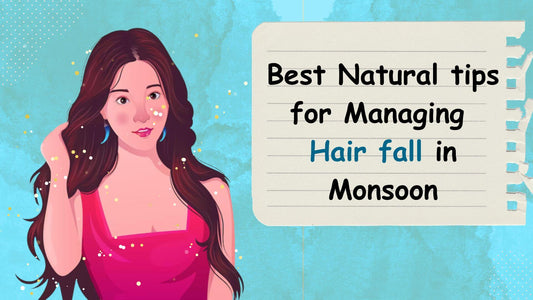
7 Best Natural Tips for Managing Hair fall During Monsoon Season
Monsoon brings relief after a scorching summer, but it also brings along sudden rainfall and increased humidity, two major culprits behind scalp and hair issues.
Many people notice reduced hair volume, frizz, and breakage during this season. That’s why understanding how to stop hairfall in monsoon becomes essential for healthy, thick hair.
Below, we’ve shared the most effective natural tips to tackle hair fall in monsoon and support hair growth.
Common Hair Problems During the Monsoon Season
Consistent rain and high humidity make hair brittle, weak, and prone to split ends. The monsoon also disrupts the body’s internal balance, particularly affecting Vata and Pitta doshas, which can cause itching, dandruff, and even bacterial or fungal scalp infections.
Greasy scalp, clogged follicles, and poor circulation worsen these conditions, reducing hair growth. If neglected, they may lead to long-term issues like baldness or alopecia. That’s why timely care is key when you're looking for how to prevent hair fall in rainy season.
Here Are the Top 7 Natural Tips for Managing
1. Not Letting Your Hair Get Wet
In rainy season if you are going outdoors make sure to protect your hair from rain, ensure that you cover yourself with a raincoat and umbrella. These precautions will help keep your hair from getting wet.
Not letting your hair get wet is crucial to controlling hair fall in the monsoon. Use a towel frequently to clean the acidic content in your hair and allow it to dry before combing.
Combing wet hair can lead to breakage and split ends, especially in humid conditions. A comb with wider gaps between the bristles is perfect in the monsoon. Avoid sharing combs to prevent the spread of scalp infections.
2. Maintain Scalp Hygiene
Maintaining scalp hygiene is crucial to prevent germs from entering your hair roots and damaging hair follicles.
It’s important to practice good scalp hygiene not just during the monsoon season, but throughout the year—whether it’s summer, winter, or spring.
Wash your hair and scalp with high-quality hair care products. Protect your hair from getting wet in the rain, avoid tight hairstyles, keep your hair dry throughout the day, and comb your hair gently.
Healthy habits and good hygiene can help control hair fall during the monsoon and address other common hair problems. They also contribute to making your hair shine and become stronger
3. Use a Hair Mask with Aloe Vera and Honey
Using a hair mask with the Ayurvedic herbs aloe vera gel and honey helps reduce hair fall
Aloe vera's anti-inflammatory properties soothe an itchy scalp, which is common during the monsoon season, and also reduce dandruff, remove dead cells, and promote healthy hair follicles.
Honey acts as a natural conditioner, keeping your hair hydrated and moisturized while adding shine.
How to use:
Mix 20g aloe vera gel with 10g honey. Apply to scalp and roots, cover, and leave for 30–60 minutes. Rinse with lukewarm water. Repeat weekly to tackle hair fall in monsoon naturally.
4. Massaging the Hair and Scalp With Ayurvedic Oil
Massaging the hair and scalp with Ayurvedic hair growth oil 2 to 4 times a week is highly beneficial.
Before applying it to the scalp, warming the oil helps stimulate its ingredients, like Amla, Bhringraj, and Shikakai, which are known to strengthen hair follicles.
These ingredients have been used since ancient times in preparing hair oils and help balance the doshas.
Massaging with warm coconut oil also reduces fungal and bacterial infections in the scalp, controls dampness, and stops hair fall in monsoon.
5. Selecting an Ayurvedic Shampoo
Selecting an Ayurvedic shampoo is safe and effective for cleansing hair from the root level during any season.
The acidic content in rainwater can disturb the pH levels in the hair and scalp, leading to bacterial growth and fungal infections.
To stop hair fall in monsoon, it is necessary to shampoo your hair after exposure to rain.
Avoid using chemical-enriched shampoos with parabens and sulfates, as they can weaken hair follicles and increase acidity in the hair.
Using the right cleanser is essential when considering how to prevent hair fall in rainy season due to exposure to rainwater.
6. Applying Neem and Turmeric Paste
Applying neem and turmeric paste during this period of maximum hair fall can protect your hair and scalp from infections.
Nutrients like Vitamin C and antioxidants in neem and turmeric nourish and soften the hair while strengthening hair follicles. Applying this paste every 15 days is recommended.
You can also use a mixture of two tablespoons of honey with half a cup of water on your hair for 30 to 60 minutes, then rinse with lukewarm water to manage hair fall in the monsoon.
7. Planning a Nutrition-rich Diet
Planning a nutrition-rich diet is essential for addressing hair and scalp issues. Minerals like biotin, iron, magnesium, and zinc improve the strength of hair follicles and support healthy hair growth.
Including lean meats like chicken, fish, and eggs in your diet can provide these essential minerals for dense and thick hair.
During extreme hair fall in monsoon, you can also take multivitamin tablets. Incorporating sprouts, flaxseeds, spinach, and green vegetables into your diet will further support hair health.
If you're facing severe hair fall, multivitamin supplements can be considered. Nutrition is key to understanding how to prevent hair fall in rainy season in a holistic way.
We Recommend Sat Kartar’s Hair Care Products for Holistic Hair Health Management!
Hair fall often peaks during the monsoon season, affecting many people. Over a lakh customers have ordered Aadved hair products from Sat Kartar online. Both men and women have successfully used Aadved for managing hair fall throughout the year.
The Aadved’s ayurvedic hair care products features a potent blend of herbs such as bhringraj, shikakai, indigo, gudhal, and brahmi. This combination is designed to address various hair problems and provide effective treatment for hair fall in any season.
Conclusion
Monsoon is beautiful, but not for your hair. Many of us have problems like greasiness on the scalp, irritability, itching, dandruff, and heavy hair fall in the monsoon.
We need to take special care of our hair and scalp by carefully choosing the right oil for massaging and hair cleansing shampoo.
Ayurvedic formulas will work the best in stimulating dense hair growth and stopping hair fall. There is a need to make restrictions on the diet by including minerals like iron, zinc and vitamins.
FAQs
Q.1 Is it normal to lose hair in a monsoon?
Ans: Yes, it is normal, but excessive hair fall is not normal. In monsoon, atmospheric conditions remove all the nutrients from the hair and scalp.
But regular head massage with ayurvedic oil, cleansing with ayurvedic shampoo and nutritional diet rich in iron and zinc will help in reducing the hair problems in monsoon.
Q2. How to treat hair in the monsoon?
Ans: Have a regular massage with an ayurvedic oil, let’s say Bhringraj or coconut oil. Clean it regularly and have a lot of iron, zinc, folates, and vitamins for nourishing your hair, and drink a lot of water.
Q3. Is monsoon hair fall reversible?
Ans: Yes, through oiling and cleansing with ayurvedic hair oil and shampoo, you can reverse your hair fall. But, the results vary depending on person's health condition.
References
- Guo EL, Katta R. Diet and hair loss: effects of nutrient deficiency and supplement use. Dermatol Pract Concept. 2017 Jan 31;7(1):1–10. doi:10.5826/dpc.0701a01. PMID: 28243487; PMCID: PMC5315033. Available from: https://www.ncbi.nlm.nih.gov/pmc/articles/PMC5315033/
- Kaur H, Puja P, Shetty S. The Minus One Rule of Hairwash in Monsoon. Asian J Res Dermatol Sci. 2021;4(1):95–100. Available from: https://journalajrdes.com/index.php/AJRDES/article/view/26
- O'Connor K, Goldberg LJ. Nutrition and hair. Clin Dermatol. 2021;39(5):809–818. ISSN: 0738-081X. doi:10.1016/j.clindermatol.2021.05.008. Available from: https://www.sciencedirect.com/science/article/pii/S0738081X21000729
- Groves P, Marsh JM, Sun Y, Chaudhary T, Chechik V. Effect of humidity on photoinduced radicals in human hair. Free Radic Biol Med. 2018;121:20–25. ISSN: 0891-5849. doi:10.1016/j.freeradbiomed.2018.04.548. Available from: https://www.sciencedirect.com/science/article/pii/S0891584918307238

Dr. Geeta Pathak
Dr. Geeta Pathak is an Ayurveda practitioner with a BAMS degree, who has managed chronic and lifestyle diseases. She is respected for her holistic approach that balances body, mind, and spirit. She specializes in respiratory issues, mental health, and hair care, providing natural remedies and customized treatment plans to help her patients achieve optimal wellness.



